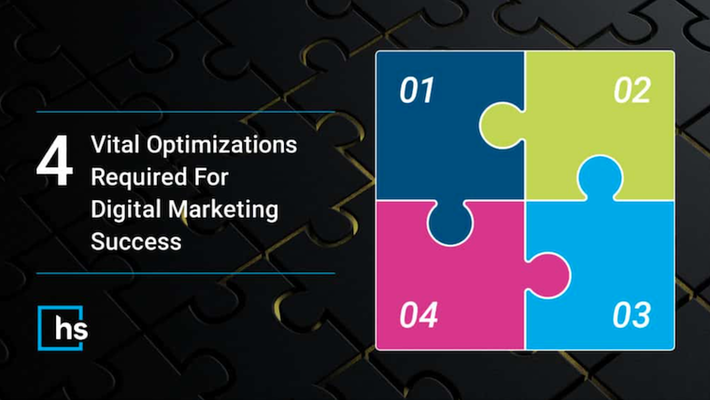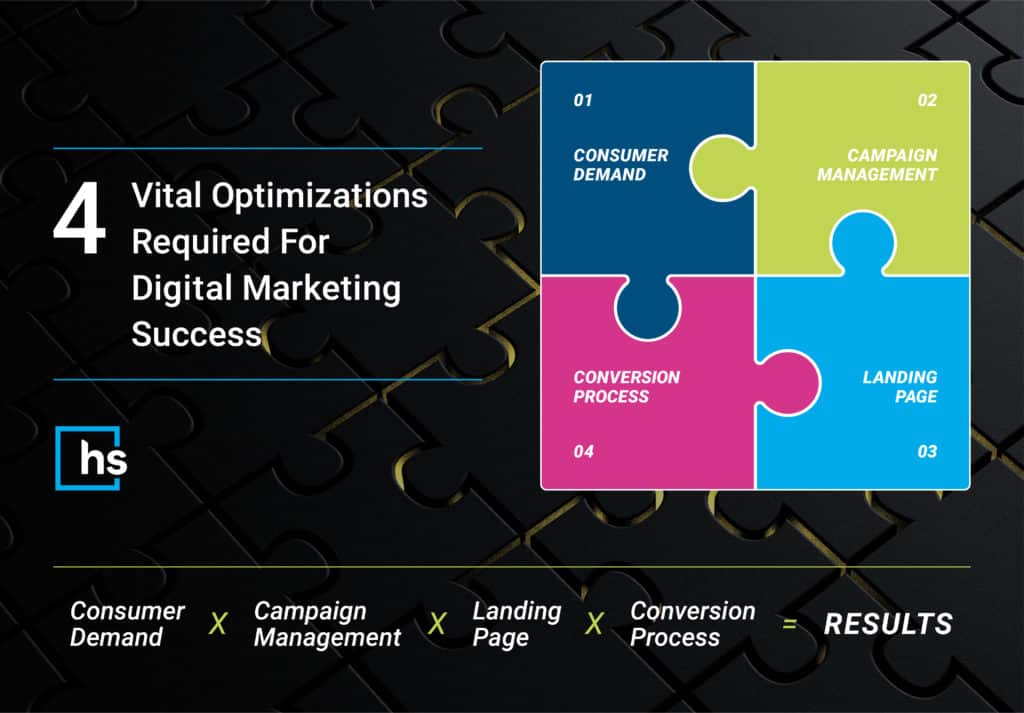
I’ve noticed that most people tend to focus on only one of four variables when optimizing their digital marketing results. That’s a shame because true optimization requires a more strategic approach that considers each of the following four factors:
Let’s take, for example, paid search (e.g., search engine marketing, SEM, pay-per-click, or PPC). Because it generates results quickly, often yields the lowest cost per acquisition, allows for real-time testing, and scales incredibly well, Google Ads often forms the bedrock of most digital marketing campaigns.
All too often, we see marketers and clients focusing solely on one piece of the puzzle: the "in the machine" campaign management. But in reality, more than campaign management is needed to directly influence consumer demand, the inquiry rate, or patient conversions.
To truly maximize your paid digital marketing campaigns, each factor must build upon the other to compound campaign effectiveness.

Before you can start building and optimizing your digital ad campaign, you need to determine overall consumer demand for your product or service—and how to effectively funnel high-intent audiences into your ad campaign, landing page, and conversion process.
You’ll need to understand how many people are searching for the solution you’re offering and how they're searching for it. So be sure to use the Google Ads keyword tool (or others) to estimate likely demand.
At the same time, while consumer demand can seem largely out of your control, remember that “push marketing” strategies like traditional advertising, social media marketing, and programmatic advertising can also stimulate demand.

Campaign management is a crucial part of any successful paid search marketing campaign. It allows you to oversee every aspect and make on-the-fly, real-time adjustments to boost its effectiveness and maximize ROI (return on investment) and ROAS (return on ad spend).
Here are the key elements PPC (pay-per-click) managers must keep tabs on and regularly optimize to ensure campaign success:
Hiring an expert to manage your paid search campaigns is essential for staying ahead of your competition, maximizing your ad spend, and driving new leads and revenue to your healthcare business.

Another often overlooked yet crucial piece of driving sales and revenue is your campaign landing pages. These pages can be unique to the campaign or pre-existing pages on your website.
Whichever route you decide to take, the marketing copy must support and add value to the pay-per-click ad.
It has to persuade visitors into action (e.g., download, call, or fill out an online form).
Considering all page elements and the patient experience they create is essential. Keep these questions in mind to build landing pages that sell:
Optimizing your landing pages ensures the highest possible conversion rate from visitors, lowers your customer acquisition costs and maximizes the value of your ad spend.

Now that you’ve stimulated demand, driven consumers to a value-add landing page via a targeted paid search ad, and persuaded them to click, call, or fill out an online form—how are the inquiries handled offline?
The patient conversion process should never be an afterthought. It should also never be handled by busy front office personnel or employees that haven’t been trained.
When potential patients navigate to and take action on your landing page, they intend to purchase your products or services. Don’t squander the opportunity with a weak conversion process.
Here are a few ways to increase call conversions:

Here’s your insight for the day.
Each of the above four factors is EQUALLY important. What’s more, these variables combine to yield multiplicative results, not merely additive results.
To understand what I am saying, imagine if one of the four steps is a complete failure or a “zero.”
If the results were merely additive, you could have a complete failure at one step (0) yet still get results by making up for it elsewhere.
But that’s not what happens in the real world at all. If you were to fail at converting inquiries into patients, for example, you’d have ZERO results - no matter what happened with the other variables.
So conceptualize the following algorithm:
Consumer Demand X Campaign Management X Landing Page X Conversion Process = RESULTS
So, if you can increase the effectiveness of one step by 20% (e.g., phone conversions), you’ve just increased your overall outcome by 20%. But if you could increase all four variables by just 20% each, your compounded results would be 107% better!
Key things to remember:
Each piece of this puzzle builds on the other to deliver. If you can optimize these four factors, your business will realize more high-quality conversions, appointments, and revenue.
Stewart Gandolf
The original version of this page was published at: https://healthcaresuccess.com/blog/healthcare-marketing/four-vital-optimizations-required-for-digital-marketing-success.html
Founded in 2006, Healthcare Success is a respected, full-service brand performance marketing agency focused on healthcare and recognized as a thought-leader in the industry.
Coronavirus Notice to Clients and Prospective ClientsHealthcare Success remains fully operational and open for business despite the COVID-19 pandemic. We have taken the proper precautions ...read more
We hope your holiday season was filled with good cheer and plenty of new business opportunities.Now that the holidays have drawn to a close, it’s time to return to your 2024 ...read more
Business leaders in every industry understand that morale starts at the top. When the C-suite is aligned and shares a unified, consistent message throughout the entire organization, ...read more
Targeted advertising is powerful and effective. It relies on data about who your audience is and what they are looking for. Up until recently, advertisers had easy access ...read more